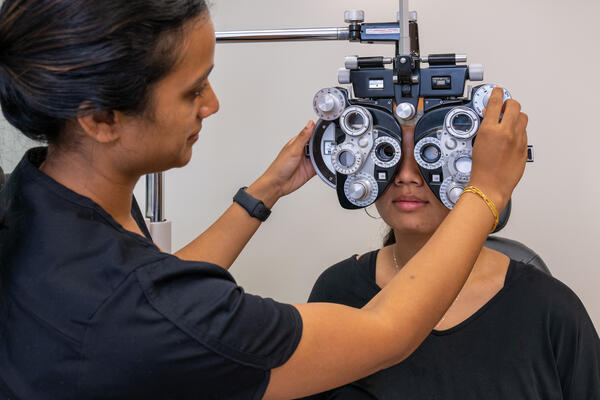Andalusia Pediatrics: Exceptional Take care of Children's Health Requirements
Is Refractive Surgical Procedure Right for You? Factors to Think About for Better Eyecare
In the realm of eye care, the decision to undergo refractive surgery is a significant one that demands thoughtful factor to consider. From the details of one's ocular health and wellness to the complexities of day-to-day behaviors and individual assumptions, each aspect holds value in the more comprehensive landscape of refractive surgical procedure candidateship.
Eye Health And Wellness Assessment
When thinking about refractive surgical treatment, an extensive eye health analysis is crucial to analyze the viability of the procedure for each person. andalusia pediatrics. This assessment involves a collection of exams and tests conducted by an eye treatment expert to determine the general health of the eyes, the visibility of any kind of underlying problems, and the stability of the refractive error
Throughout the examination, different factors are considered, such as the person's case history, existing eye prescription, corneal density, pupil dimension, and tear film quality. These analyses assist to identify any contraindications to refractive surgical procedure, such as corneal problems, cataracts, or without treatment eye infections. Additionally, the analysis helps to take care of client assumptions relating to the possible end results of the surgical procedure based upon their unique eye attributes.
Ultimately, the eye health examination is essential in guaranteeing the safety and security and performance of refractive surgery, as it supplies valuable insights right into the person's eye wellness standing and helps identify one of the most ideal treatment choices for accomplishing optimum aesthetic end results. (eye doctors in andalusia)
Way Of Life Evaluation
A thorough lifestyle assessment is essential in determining the viability of refractive surgical procedure for a person's visual modification requirements. Lifestyle factors such as profession, hobbies, and daily tasks play an important role in the decision-making process pertaining to refractive surgical procedure.
Additionally, way of life routines such as sports involvement, outdoor activities, and even skin care regimens can affect the recovery process and total success of refractive surgical treatment. As an example, individuals that engage in call sporting activities may require to take extra preventative measures to protect their eyes during the recuperation period. In addition, people with extensive sun direct exposure might require extra post-operative treatment to avoid complications. By carrying out a detailed lifestyle evaluation, eye treatment professionals can tailor their suggestions and therapy strategies to meet the special needs of each client, inevitably causing enhanced visual results and fulfillment.
Expectation Positioning

Setting reasonable expectations entails detailed pre-operative conversations between the eye doctor and the person. The specialist ought to transparently communicate the potential threats, advantages, and restrictions of the procedure (eye center andalusia). People require to understand that while several people accomplish 20/20 vision or better adhering to refractive surgical procedure, some might still need glasses for certain tasks like analysis or driving at night. Handling these expectations helps prevent dissatisfaction and frustration post-surgery, resulting in a much more positive general experience for the patient.
Risk Analysis

Aspects that may boost the danger of difficulties include age, particular clinical conditions like autoimmune conditions, unstable vision prescription, slim corneas, and impractical client assumptions. Additionally, picking a knowledgeable and skilled doctor, complying with pre and post-operative treatment directions diligently, and revealing any kind of redirected here relevant case history can aid mitigate threats.
To reduce the probability of complications, ophthalmologists carry out detailed pre-operative evaluations to determine any type of contraindications more tips here to surgical procedure. They also go over the possible risks and advantages with people throughout the consultation process. By taking part in open communication and shared decision-making, both the client and the ophthalmologist can work together to figure out if refractive surgical treatment is the ideal selection based upon private threat accounts and preferred results.
Examination Relevance
Taking into consideration the essential duty of educated decision-making in assessing risks and prospective issues in refractive surgical treatment, the assessment process holds significant significance in assisting individuals towards optimal outcomes. During the appointment, the ophthalmologist assesses the patient's eye health, refractive errors, and general viability for surgical treatment. This preliminary assessment is critical in establishing one of the most suitable treatment for every individual, considering variables such as corneal thickness, student dimension, and existing eye conditions.
In addition, the examination functions as a possibility for clients to review their assumptions, concerns, and any kind of concerns they might have relating to the surgery. Clear interaction between the patient and the doctor is necessary to make sure reasonable assumptions and a detailed understanding of the prospective threats and benefits entailed.
Additionally, the appointment enables the surgeon to describe the various medical choices available, their corresponding results, and the post-operative care called for. This extensive conversation encourages clients to make educated choices about their eye treatment, bring about much better contentment and outcomes post-surgery.
Final Thought
To conclude, individuals thinking about refractive surgical treatment needs right here to undergo a thorough eye health assessment, examine their way of living behaviors, align their expectations with potential outcomes, evaluate the connected threats, and focus on consultations with eye care professionals. These elements play a vital duty in establishing the viability of refractive surgical procedure for each person, ensuring optimal outcomes and complete satisfaction with the procedure.
Clients thinking about refractive surgical treatment usually have high assumptions pertaining to the end results, anticipating excellent vision without the demand for glasses or call lenses. While refractive surgical procedure can greatly improve vision and minimize dependence on visual aids, it is crucial for patients to recognize that outcomes may vary based on specific aspects such as the degree of refractive mistake, corneal density, and general eye health.
By involving in open interaction and shared decision-making, both the eye doctor and the individual can work together to establish if refractive surgical treatment is the best option based on individual threat profiles and desired outcomes.
Taking into consideration the essential duty of notified decision-making in examining dangers and prospective complications in refractive surgical procedure, the appointment procedure holds significant relevance in assisting people towards ideal outcomes. Throughout the examination, the ophthalmologist examines the patient's eye health and wellness, refractive mistakes, and general viability for surgical treatment.